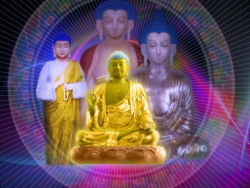Awareness of the mind
Awareness of the mind (Cittā) is the third part of the 4 Foundations of Mindfulness in the Satipatthana Sutta.
After doing some preliminary work with Mindfulness of breathing and Mindfulness of sensations, you might also notice some emotions arising or some thoughts. Just let the thoughts come and go.
Do not cling to any and do not push any away.
You will notice that the mind tends to wander off in thoughts quite often.
This is normal. Just watch the thoughts and see how they come and go, not lasting for very long. If the mind wanders away in thoughts and it starts to bother you, then just bring the attention back to the breath.
You might notice some thoughts of anger coming to you.
Maybe you remember something or someone that makes you angry. This anger eats at you inside.
As you sit in meditation you can feel the heated sensations.
You may feel your heartbeat going faster. You see how this is hurting you.
You realize that these negative emotions hurt you first instead of whom your anger is directed towards. This is a form of realization.
You can discover the truths of the Buddha’s teachings for yourself.
It is impossible to be angry at someone without hurting yourself first. Therefore, you aim to have more peaceful thoughts and feelings toward yourself and others.
Anger is sometimes believed to be good, as something that needs to be “released” to make you feel better. The sensations of heat that come with anger only worsen while you are in a rage.
The “release” only becomes an escalation of negative feelings and sensations.
The anger worsens the situation for the one with the anger and the one who is on the receiving end.
We do not need to suppress our anger, we just need to have more equanimity, compassion, sympathetic joy, and loving-kindness so that there will be no anger to “release” or suppress.
The result will be an inner peace free of negativity and free of painful sensations for you and others.
Eventually in the practice you might experience some states of great joy, bliss, contentment, utter peacefulness, or even a state where you no longer “feel” any of your senses.
Do not get fooled, these are not enlightenment experiences, but they are very pleasant experiences that may be “stepping-stones” on the Path to enlightenment.
Do not cling to these experiences or try to make them happen.
If you do they will NOT come or will NOT stay.
Just watch these experiences. See: 9 Jhanas.
Source
http://www.dhammawiki.com/index.php?title=Awareness_of_the_mind

